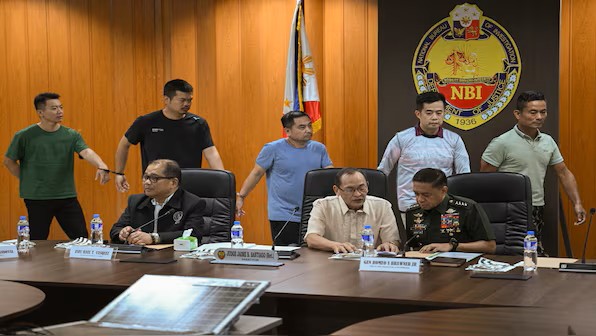The Philippines has arrested five Chinese nationals on charges of espionage, just weeks after a similar arrest. These arrests come at a time when tensions are increasing between the Philippines and China, especially concerning disputed territories in the South China Sea. Both countries have been involved in conflicts over various reefs and waters in the region for years, and the situation has become even more intense recently.
Arrests Linked to Military Surveillance
The five Chinese suspects were apprehended by Philippine authorities following reports of surveillance activities involving Filipino military bases. According to security officials, two of the men were detained at Manila airport last week after they were caught spying on Filipino navy vessels. These vessels are used to supply military garrisons in the Spratly archipelago, which is claimed by both China and the Philippines.
The suspects allegedly used high-tech equipment, including drones and solar-powered cameras, to record activities at several military locations, including a naval base, coast guard station, air base, and a dockyard in Palawan province. These locations are crucial to the Philippines’ defense efforts in the disputed region. The Philippine military expressed serious concerns about the security risks posed by this surveillance.
“Such activities are very dangerous to national security,” said a top military official. If the information gathered by the spies fell into the wrong hands, it could jeopardize the safety of personnel stationed at these bases and on the ships. The authorities emphasized that the suspects were well-prepared, disguising themselves as buyers of marine products or members of legitimate organizations to avoid detection.
Chinese Spy Suspects Posing as Taiwanese Tourists Arrested in Palawan
More Arrests Across the Country
The arrests of these five individuals followed the detention of another Chinese man earlier this month. A Chinese software engineer named Deng Yuanqing was arrested along with two Filipino associates on suspicion of spying on military and police camps. The Chinese Embassy in Manila quickly denied the accusations, calling them “baseless speculation.”
This arrest raised suspicions that there could be a network of spies operating in the country. As it turns out, the five men arrested last week were allegedly meeting with Deng once a month. They were reportedly acting under the instructions of a mysterious “foreign national” in China. However, Philippine authorities have not yet confirmed who is receiving the intelligence these spies were gathering.
In addition to the five recent arrests, two other Chinese nationals were detained in separate incidents in Manila, and one more was arrested in Dumaguete, a city located in the central part of the Philippines. Officials noted that some of these suspects had been living in the country for years, with some having arrived as early as 2002. Despite their long stay in the Philippines, none of them had previous criminal records, according to the immigration bureau.
Military-Grade Equipment Confiscated
During the arrests, authorities discovered “military-grade” surveillance equipment, including advanced cameras and drones. The suspects were paraded in front of the media, handcuffed together and surrounded by the confiscated gear. This equipment was seen as a clear indication that the spies were using highly sophisticated tools for their surveillance activities.
Philippines Arrests Deng Yuanqing Over Espionage Equipment and Spy Allegations
While the Philippine military has expressed concern about the risks posed by these espionage activities, they have yet to confirm whether the Chinese government is directly involved in the spying. It remains unclear whether the spies were acting on behalf of the Chinese government or working independently. Philippine military officials have warned that the arrest of these suspects might just be “the tip of the iceberg,” suggesting that there could be more spies operating in the country.
These arrests add to the ongoing tension in the South China Sea. China claims most of the strategic waters in the area, despite an international ruling that denies the legitimacy of its territorial claims. The Philippines has consistently rejected China’s extensive claims in the region, and these spy arrests only add fuel to the fire of this already heated dispute. The Chinese embassy in Manila has not yet commented on the latest arrests but has previously dismissed accusations of espionage as false.
The Philippine government has said that it will continue to take action against foreign nationals who pose a threat to national security. Despite the ongoing tension, both countries are expected to remain locked in disputes over the South China Sea, a critical and resource-rich area in Southeast Asia.


